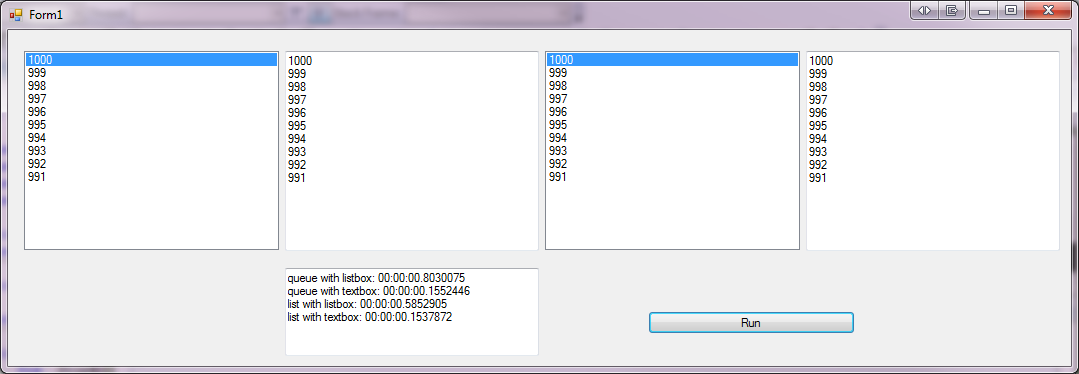Yesterday I made a post about using a queue instead of a list because the code was so much cleaner. I think it is very important that code is clean and easier to read.
But then Denis asked about the performance differences between the 2 methods. I hadn’t worried about the performance, because in my case the performance was good in both cases.
But I aim to please my fellow LTDers, so I did a little performance test. And let me remind you that like most performance tests, this one is flawed as well.
I made a form with 2 listboxes and 2 textboxes, to show the results. And 1 listbox to show the timings. And a button to start the process.

And here is the code to go with it.
Public Class Form1
Dim _lines1 As New Queue(Of String)
Dim _lines2 As New Queue(Of String)
Dim _lines3 As New List(Of String)
Dim _lines4 As New List(Of String)
Private Const _maxlines As Integer = 10
Dim _total As Integer = 1000
Private Sub Form1_Load(ByVal sender As System.Object, ByVal e As System.EventArgs) Handles MyBase.Load
End Sub
Private Sub Button1_Click(ByVal sender As System.Object, ByVal e As System.EventArgs) Handles Button1.Click
Dim _StopWatch As New Stopwatch
_StopWatch.Start()
For _Counter = 0 To _total
_lines1.Enqueue(_Counter.ToString)
If _lines1.Count > _maxlines Then _lines1.Dequeue()
Me.ListBox1.DataSource = _lines1.Reverse.ToList()
Next
_StopWatch.Stop()
Me.TextBox3.Text = "queue with listbox: " & _StopWatch.Elapsed.ToString & Environment.NewLine
_StopWatch.Reset()
_StopWatch.Start()
Dim text1 As System.Text.StringBuilder
For _Counter = 0 To _total
_lines2.Enqueue(_Counter.ToString)
If _lines2.Count > _maxlines Then _lines2.Dequeue()
Me.TextBox1.Text = ""
text1 = New System.Text.StringBuilder
For _temp As Integer = _lines2.Count - 1 To 0 Step -1
text1.Append(_lines2(_temp) & Environment.NewLine)
Next
Me.TextBox1.Text = text1.ToString
Next
_StopWatch.Stop()
Me.TextBox3.AppendText("queue with textbox: " & _StopWatch.Elapsed.ToString & Environment.NewLine)
_StopWatch.Reset()
_StopWatch.Start()
For _Counter = 0 To _total
If _lines4.Count >= _maxlines Then
_lines4.RemoveAt(0)
End If
_lines4.Add(_Counter.ToString)
Me.ListBox2.DataSource = (From en In _lines4.ToList Order By Convert.ToInt32(en) Descending Select en).ToList
Next
_StopWatch.Stop()
Me.TextBox3.AppendText("list with listbox: " & _StopWatch.Elapsed.ToString & Environment.NewLine)
_StopWatch.Reset()
_StopWatch.Start()
Dim text2 As System.Text.StringBuilder
For _Counter = 0 To _total
If _lines3.Count >= _maxlines Then
_lines3.RemoveAt(0)
End If
_lines3.Add(_Counter.ToString)
Me.TextBox2.Text = ""
text2 = New System.Text.StringBuilder
For _temp As Integer = _lines3.Count - 1 To 0 Step -1
text2.Append(_lines3(_temp) & Environment.NewLine)
Next
Me.TextBox2.Text = text2.ToString
Next
_StopWatch.Stop()
Me.TextBox3.AppendText("list with textbox: " & _StopWatch.Elapsed.ToString & Environment.NewLine)
End Sub
End Class
Clicking on “run” gives me the following result.

And here are some more numbers.
Test 2
queue with listbox: 00:00:00.3433968
queue with textbox: 00:00:00.1383573
list with listbox: 00:00:00.3251502
list with textbox: 00:00:00.1366604
Test 3
queue with listbox: 00:00:00.4358506
queue with textbox: 00:00:00.1386994
list with listbox: 00:00:00.3229863
list with textbox: 00:00:00.1359696
What does this prove? Well not much. The Queue method has pretty much the same performance than the List method. But the binding to the listbox is much slower.
Is this something to worry about? Nope.
Conclusion.
Do we use a List or a Queue? In this case we use a Queue because the code is much cleaner.




 Chris is awesome.
Chris is awesome.